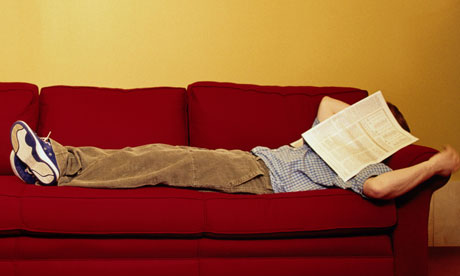
Worrying about the recession? Anxious about a big work meeting? Fretting over the performance of your football team? If these concerns keep you awake at night, you're not alone.
Getting a good night's sleep has never been so tricky in Britain, it seems, as 51.3% of us struggle to nod off. And women are three times more likely than men to suffer – 75% of women report problems, compared with 25% of men, say new statistics from the Great British Sleep Survey, which suggests the nation's health is suffering as a result of insomnia.
Professor Colin Espie of Glasgow University, the co-founder of sleep organisation Sleepio, which commissoned the survey, said the results pointed to a "real medical issue that should be taken seriously". A quarter of those with insomnia had suffered for more than 11 years.
"Insomnia affects people's quality of life during the day, not just their sleep at night," he said. "Indeed, the survey data show significant effects across different aspects of personal functioning. Living with poor sleep and its consequences is not only very common, but it is in all likelihood degrading Britain's health. This is not a trivial matter. It's time for the NHS to pay attention to the scientific evidence that persistent poor sleep elevates the risk of developing new illnesses. This has been shown in disorders such as diabetes, but also very convincingly in depression."
The Great British Sleep Survey interviewed 11,129 adults earlier this year. It found that, of those who had trouble sleeping, 55% reported having relationship difficulties as a result, while 77% reported issues of concentration, 64% said they were less productive at work, 83% reported problems with their mood and 93% with energy levels.
"The evidence is that cognitive behavioural therapy (CBT) is very effective and CBT for insomnia really must be provided on the NHS," said Espie. "It is available if you're anxious or depressed; why not for insomnia?"
A two-year study by a team from the Tokyo Medical University published last week found that people who do not get a good night's sleep are twice as likely to suffer from depression.

